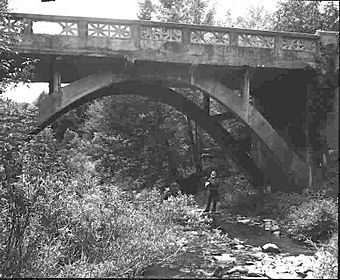Bridge in Fishing Creek Township facts for kids
Quick facts for kids |
|
|
Bridge in Fishing Creek Township
|
|

Bridge in Fishing Creek Township, 1982
|
|
| Location | Legislative Route 19078 over Little Pine Creek, east of Bendertown, Fishing Creek Township, Pennsylvania |
|---|---|
| Area | less than one acre |
| Built | 1915 |
| Built by | John L. Elder |
| Architect | G.A. Flink |
| Architectural style | Open-spandrel arch |
| MPS | Highway Bridges Owned by the Commonwealth of Pennsylvania, Department of Transportation TR |
| NRHP reference No. | 88000738 |
| Added to NRHP | June 22, 1988 |
The Bridge in Fishing Creek Township was a special concrete arch bridge located in Fishing Creek Township in Columbia County, Pennsylvania. Built in 1915, it was a unique part of the local landscape. This bridge crossed over Little Pine Creek. Sadly, this historic bridge has since been taken down.
A Look at the Fishing Creek Township Bridge
This bridge was built from strong concrete and was about 40 feet (12 meters) long. It was an "open-spandrel" arch bridge, which means it had open spaces above the main arch, making it look lighter.
The bridge had a special design. Its side railings, called a parapet, were made of concrete and had cool star-shaped patterns cut into them. These designs made the bridge stand out.
The bridge was designed by G.A. Flink and built by John L. Elder. They created a structure that lasted for many years.
Why Was It Important?
The Bridge in Fishing Creek Township was recognized for its history and design. On June 22, 1988, it was added to the National Register of Historic Places.
What is the National Register of Historic Places?
The National Register of Historic Places is a list of places in the United States that are important to our country's history. When a building, bridge, or site is added to this list, it means it's considered special and worth remembering. It helps protect these places and teaches us about the past.
Even though the Bridge in Fishing Creek Township is no longer standing, its place on the National Register reminds us of its unique history and the people who built it.
 | William Lucy |
 | Charles Hayes |
 | Cleveland Robinson |



